huacas
and huaringas
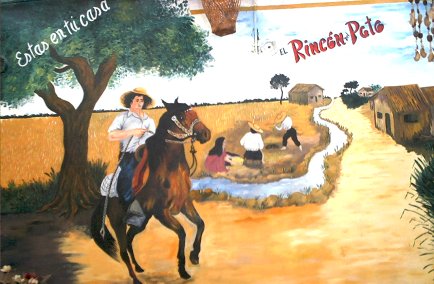
piura,
peru
july
1, 2003
hola
amigos, otre ves
by
now, we're figured out that these westerly paises (countries)
de sud america offer a tremendous geological smorgasbord:
"la costa" - the entire west coast along the pacific
- a gigantic white sprawl of desert sand and mostly uninhabited
beaches (imagine california's west coast without mulholland and
the other water barons); "la sierra" (as in "sierra"
madres) - the beautiful and sometimes glacially intimidating andes
running along the same spine of the south american continent as
the rockies do in north america (this is where machu pichu, titicaca,
and 60% of ecuador's population live); and "la selve",
or "oriente" -- da jungle - as in da amazon and the
whole collectivo of major rivers and diminutive tributaries
that criss cross and transport the whole central part of south
america east of the andes.
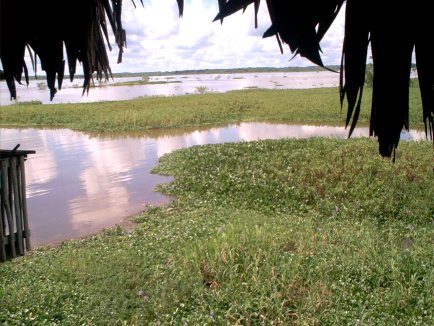
we've
been mixing it up - back and forth across these geological planes
- from lima's winter desert along the coast to machu pichu's andean
"summer" (i don't how they account for this; i thought our
summer was south american winter - but hey, they say when it doesn't
rain in cuzco, it's "summer". ok, but jesus christo,
it's cold). then after our trip to iquitos in the sweltering and eternal
summer of the amazon, we made our third trip back to lima where we
cashed in culturally speaking by seeing the great peruvian diva, eva
ayllon, and by visiting "las brisas de titicaca", to see
the colorful folklorico and contemporary dancing of todo
peru (from the marineras of trujillo in the north to the
costumed spectacles of puno in the south). only then, after saying
farewell to our dear & perfect servas host, felipe, did we finally
commit to start bumping, bussing, and climbing our way north.

first
to trujillo, about an 8 hour bus ride north from lima. along the aforementioned
barren pacific coast. arriving in the city the spanish conquistadors
"founded" in 1534, paving the streets of the ancient mochi,
chimu, & inca cultures with pedestrian filled plazas, colonial
"casas antiguas", and of course as many iglesias de
dios as humanly and catholically possible. it's still a beautiful
city, but how many plazas and iglesias can a new york gringo
and an indonesian princess take? we decide to head to the beach. huanchaco.
surfer heaven during the hi season (december - march) and low key
artist and fisherman haven during the low. as in now. we have come
just in time to see the annual festival of "caballitos de totora".
(of course, you can't trust the "annual" part, you never
know when another festival is going to march or flow by). but this
one features the ancient indigenous fishing boats made from "totora"
reeds that look like they're woven together like straw hammocks, but
ay carumba, watch the young black haired boys ride the waves
in these skimming caballitos like macho waikiki surfers.
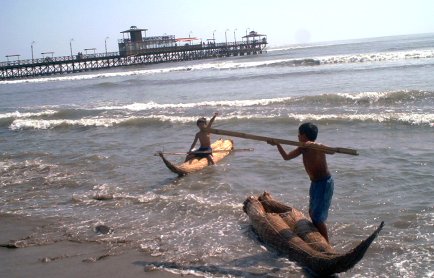
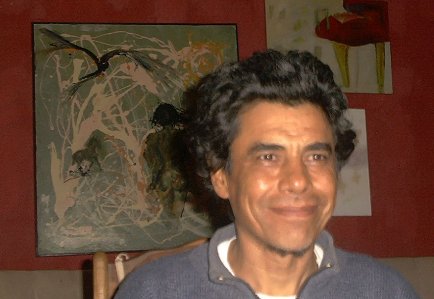
we
meet a local sculptor, rasta-haired luis, who runs a little club on
the plaza de armas with the best eclectic and aboriginal
collection of world music i've ever heard. i could spend about a week
there listening and copying, but time is becoming precious and we
still have todo ecuador to see. but we do allow luis to take
us under his wing for a couple of days, telling us about his exploits
with san pedro, the mescaline bearing cactus that is used
as a spiritual geiger counter to inspect all the body's and soul's
misfortunes and malpractices. he offers us a personal, spiritually-guided
tour with a local shaman at the beach, but unfortunately, the water
is too cold to swim in, and our haul north too demanding to take advantage
of his generous offer.
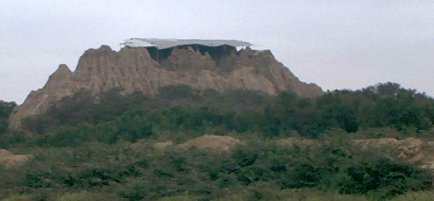
we
push on from huanchaco to chiclayo, center of the multicultural indigenous
civilizations from the lambayeque area of northern peru. actually
we stay with a servas host in ferenafe, who turns out to be director
of one of the world class museos in the lambayeque area.
he sends us off on a day long, also personally designed tour of the
whole area. we go to several of the local "huacas",
adobe temples of the indigenous pre-columbian people. having
missed the huacas of the mochi at chan chan near trujillo,
we go to see the "huaca larga" at tucume, the largest abode
structure in south america. founded and built by the descendants of
legendary king naylamp (who mythically ascended from sea to sky to
join his animistic and anthropomorphized gods), larga looks like a
eroded pyramidical mud heap, much like what might happen to LA &
the pacific palisades in about 100 years. but upon precariously climbing
to the top, we can see the remnants of the horizontal mud bricks -
by the millions - that must have gone into making this temple and
city of the "sican" culture, during the region's transition
between the mochi (500 bc - 700 ad) and the warlike and conquering
"chimu" culture (800 -1200 ad). it seems that the spanish
were not the only war-like and punishing tribe to force their weapons,
religion, & culture upon an inferior enemy. for after the incas
conquered the chimu in 1370 to make them the greatest and most expansive
culture in the pre-columbian americas, it only took another 60 years
for the incas to self destruct, by weakening themselves enough with
a fraternal, civil war, until the spanish marched mightily to cuzco,
capturing the last incan, atahualpa, who after paying a king's ransom
of a room full of gold and silver, was still put to death by the lying
pizarro in 1533.

we
truck on through the poma forrest (with 1000 year old carob
trees still living off the water buried deep beneath the desert) to
see the "tombes" of senor sipan in lambayeque (not
to be confused with those of senor sican in ferenafe). discovered
in 1987 and considered to be one of the greatest archeological achievements
of the 20th century, the tombs of senor sipan, a mochi warrior-priest
from about 300 ad, these tombes are considered comparable
to the treasures of egyptian king tut. in this one 3 floor museum,
we see the restored artifacts, pottery, jewelry, and crypts of this
mighty dude's entire entourage. his wive(s), guards, servants, dogs,
& decapitated llamas (for post mortal sustenance) are all buried
with him. we don't find out whether they were all put to death for
the senor's burial ceremony or later added to the tomb, but not seeing
the remains of any children, we lean towards a theory of cruelty (towards
the llamas & wives) and another of leniency (towards the spared
kids).
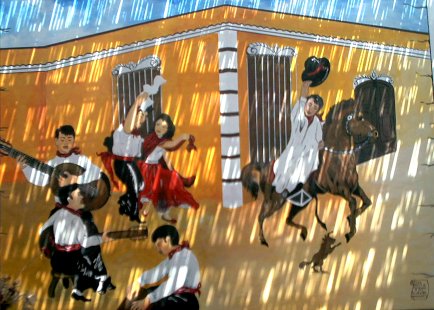
next,
north to our last city in peru. piura. we meet up with our last generous
servas host, elizabeth, whose old colonial hacienda in the center
of town is unfortunately filled with relatives from all over peru.
she graciously loads up two mattresses onto the roof of a taxi to
bring them and us to one of the her family’s apartments nearby
in the city (apparently the former residence of miguel grau, historic
naval admiral of the war of the pacific - and piura's pride &
joy). unfortunately, seeing no dishes, towels, toilet paper, or in
fact anything, we opt for another "hotel california" (apparently
the gringo hostal of choice in peru). i agree to go to an
english class of brother fritz, and i manage to both entertain and
terrorize the mixed bag of basic english students, by making them
each ask me a question in english. (and throwing an eraser at an inattentive,
basketball-loving 14 year old).

we
have one more decision to make before leaving peru -- whether to journey
east to the "huaringas" of el rio huancabamba. you see,
the huaringas are a series of about 14 lakes that are home
to the local residents of "chamanes, brujos, curanderos, y maestros".
peruvian bomos. witch doctors. healers. whether you suffer from ailments
of the heart, head, body, or soul, one of the local 83 registered
maestros promise you a cure. ceremonies begin at one of the
lakes (depending on your aliment and maestro), about a 3
hour walk or 2 hour horse ride from the small pueblo, salala. the
bulk of the ceremony takes place at night, and is known as "la
mesada" or "la mesa", during which both patient and
maestro take a "remedia", a hallucinogenic tea
brewed from the "huachumba" (rasta luis' san pedro cactus).
the tea creates a metaphysical vision that prepares the patient for
the imminent ceremony and cure. various spirits (and saints) are invoked
with the aid of incense, staffs, swords, and amulets during the all
night invocation and ceremony, and the ardent seeker returns home
the next day, hopefully cured of his ailment or problema.
the whole trip takes about three days and who knows how long for recovery,
so once again, wati and i pass on the spiritual journey and instead
vow to work on our own amorous problemas with a renewed and
inspired conviction.
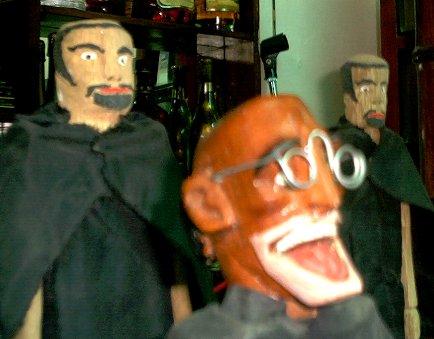
but
before we leave piura, just for curiosity -- and hell, why not, we
visit a local curandera in ferenafe. our knowledgeable and
helpful driver happens to know one such woman, and after checking
with her, we are led into her atelier. there are about 5 or 6 other
clients sitting patiently in a row of white plastic chairs along the
bare concrete floor. there is a small semi-white dividing curtain
in the back of the long room, and we are given instant access. in
my pitiable espanol, i describe our amorous problema (subject
of another epistle) to the curandera. she gets the gist,
and says “si”, she can help us. "cuanto?" i
inquire. "cuatro dolores y cinquenta". "cuatro y cinquenta?"
i repeat, using my new yawk gringo trained traveler's sense of verifying
all things monetary. "si", we hear. ok, muy barrato
(cheap). we proceed. she asks for 2 locks of our hair - and a photograph
-- we provide both -- and she says return tomorrow - a las diez
- when she will have collected the requisite herbs and amulets. oh
-- and bring one more thing - a pair of underwear from each of us.
okay....... underwear. right. i mean, what do we expect? this is peruvian
black magic. we -- proceed. she asks me to tie the 2 locks of hair
together, which i do, and she puts them - and our names – into
a little plastic bag. we're set. hasta manana. except for
el dinero. the money. okay. i pull 10 dollars out of my wallet.
diez dollars U.S. i give it to her. she looks at our guide.
he shakes his head. he takes my wallet and looks. "cuatro cientos
y cinquenta," he says. "que?" i say, already knowing
i'm up shit's creek. cuatro CIENTOS, dude. four HUNDRED dollars.
and fifty.

wati
and i look at each other. we look at the guide. we look at the curandera.
"lo siento, senora. penso tu digeme QUATRO dollares." "no,
no, no, senor. cuatro CIENTOS". "no, no, no, senora............
solo cuatro!!!" and thus it goes. an embarrassing anti-negotiation
-- whose end result is -- finally -- the taking back of our plasticized
entwined hair, paying her a token "cuatro" dollares, and
backing our way out the door. mucho "malu", as wati would
say in her own bahasa language. mucho embarrassed.
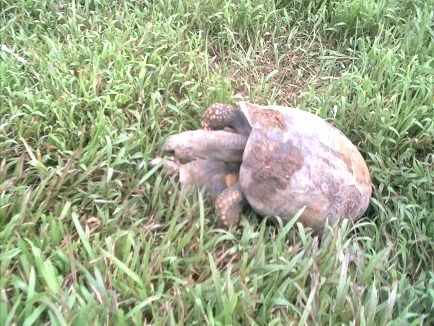
of
course, i don't really indulge in any of this hallucinatory hokus
pokus or peruvian huaringas-curandera mumbo jumbo. it's all hearsay,
don't you know.
and
makes for a good story...........
until
the next one.........
hope
you're all well -- physically, spiritually, and hallucinagenically
speaking,
love,
don
enrique de los huacas y huaringas


|





